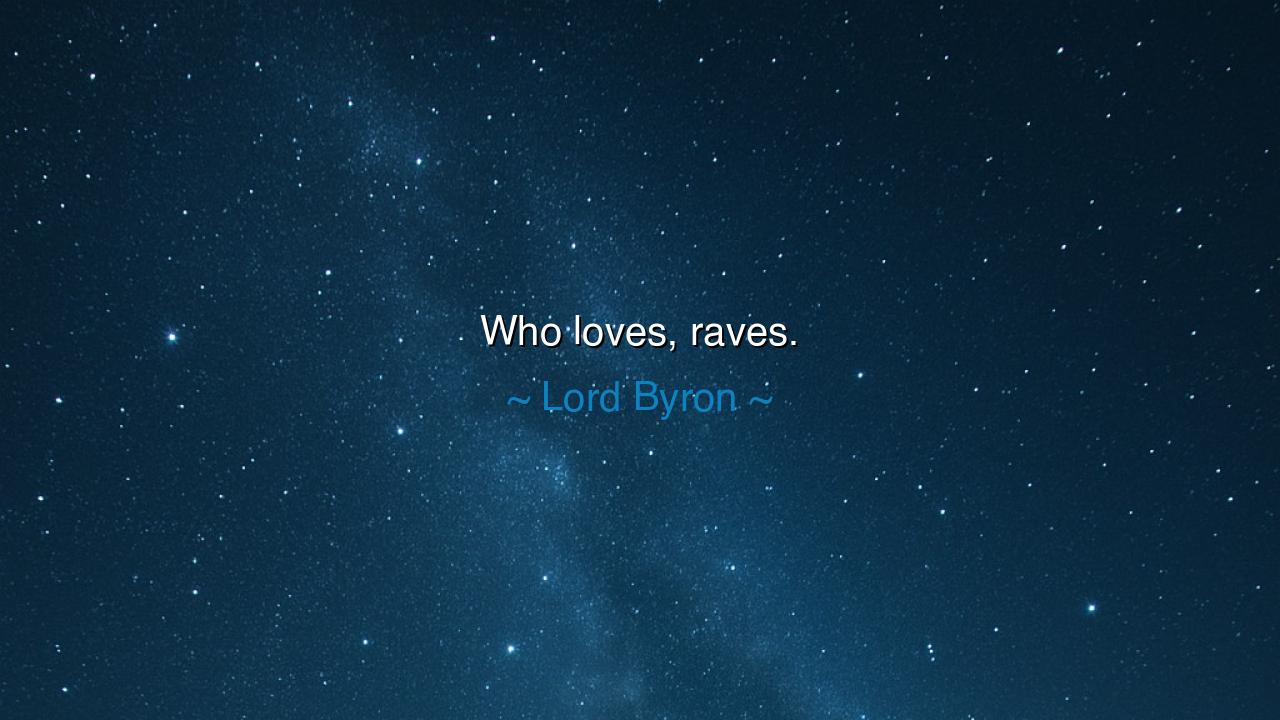
Who loves, raves.






“Who loves, raves.” Thus spoke Lord Byron, the tempestuous poet whose soul knew both ecstasy and ruin. In these three words, he unveiled a truth both beautiful and terrible — that love is not a quiet guest in the heart, but a storm that seizes the spirit. To love deeply is to rave, to burn, to be consumed by the fire of devotion until reason trembles before the power of emotion. The ancients would have called it divine madness — that holy delirium which the gods themselves bestowed upon mortals to lift them beyond the mundane. Byron, in his dark brilliance, knew that passion and madness are twin flames, born of the same spark that ignites both poetry and tragedy.
For in truth, love does not dwell in moderation. It is not the tepid affection of comfort or convenience, but the boundless force that moves mountains, births nations, and drives men to both creation and destruction. To love is to lose the measured calm of the intellect and to surrender to the wild music of the heart. Plato, in his dialogues, spoke of this — of Eros, the god who wounds and awakens, who drives mortals toward beauty even as he unravels their composure. When one truly loves, one’s soul raves — not with madness alone, but with the exaltation of having glimpsed eternity through another being.
Consider the story of Tristan and Isolde, the doomed lovers of ancient legend. Bound by a potion, they fell into a love so fierce it defied all law and reason. They could not live apart, nor together in peace. Their hearts raved with longing, their minds burned with guilt, yet neither could turn away. In their madness, they found both torment and transcendence. Their tale, though tragic, reveals Byron’s truth: to love is to surrender one’s sanity to the sacred chaos of the heart. For it is in that very chaos that we touch the divine, even as it consumes us.
And yet, not all raving is ruin. The raving of love can also be creation — the muse that drives the poet to write, the artist to paint, the mother to cradle her child through sleepless nights. Every act of devotion, when born of love, carries a trace of that divine frenzy. Michelangelo, when asked why he toiled endlessly to free forms from marble, said that he could feel the soul of the statue trapped within, begging to be released. That was love, too — a raving love for beauty, for truth, for the immortal essence hidden beneath imperfection. Thus, the madness of love is not mere disorder; it is the soul’s yearning for union with what it adores.
Byron’s own life was testimony to this truth. He lived as one possessed — by words, by passion, by the unrelenting pursuit of beauty. His loves were tumultuous, his friendships fierce, his battles internal and unending. Yet from his raving heart came poetry that has outlived centuries. The lesson is clear: those who dare to love fiercely will never live tamely. Their souls will burn, their voices will echo through time, because love, when pure and unrestrained, transcends mortality itself.
Let us then not fear the raving of the heart. To live without passion is to exist as a shadow. The ancients did not worship calmness — they revered fire, for fire transforms. The one who loves truly may stumble, may weep, may lose reason for a season, but they gain something far greater — the knowledge that they have lived deeply, that their soul has touched another and been changed forever. The world remembers not the cautious, but the ravenous lovers, the dreamers who dared to lose themselves in the name of something greater than the self.
So, my children of the future, when love comes to you like a storm, do not flee. Let it shake you, humble you, break you open. For only then will you know what it means to be truly alive. Love boldly, even when it aches. Rave nobly, even when reason falters. In your giving, in your longing, in your madness, you will find your truth. For Byron spoke not of destruction, but of transformation — of the sacred fire that refines the soul. And when the storm has passed, and your heart still beats with the echoes of love’s thunder, you will know that you have touched the eternal, and that the gods themselves once whispered through your veins.
Thus remember: “Who loves, raves.” And blessed are those who rave — for they have known the full measure of being alive.






AAdministratorAdministrator
Welcome, honored guests. Please leave a comment, we will respond soon